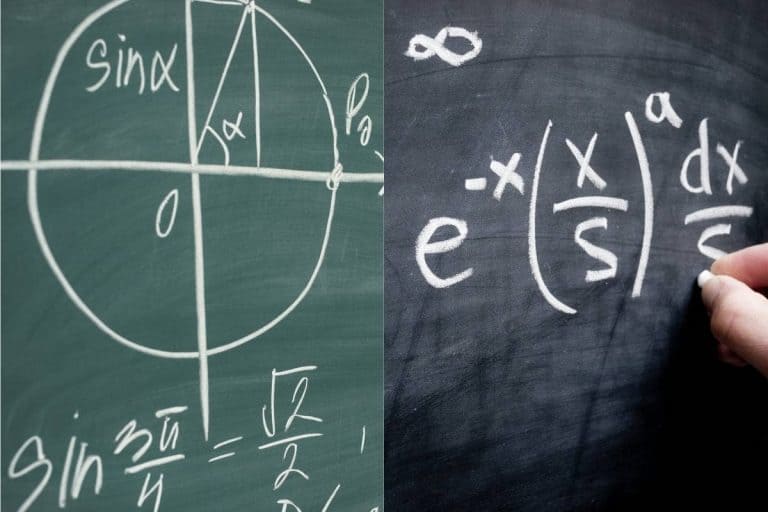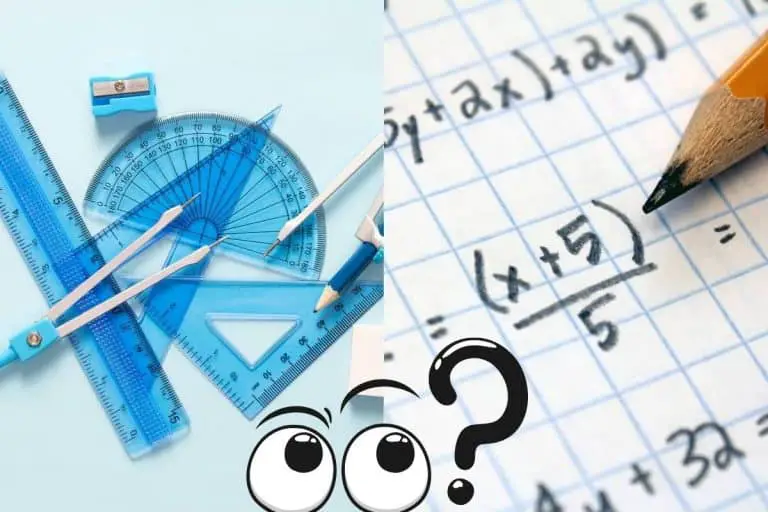Trigonometry vs. Algebra: How To Choose the Right Course
Choosing college subjects can be a daunting task, especially when you’re trying to decide between subjects that seem similar. For instance, you may wonder how to choose between trigonometry versus algebra. While both fall under the general umbrella of mathematics, they require different skills and can be used for different purposes.
Trigonometry and Algebra are both higher math subjects, but Algebra deals with solving equations while Trigonometry deals with calculating angles. Choosing the right course depends on the career path you choose and how far in math you want to go.
This article will give you all the information you need to choose between college-level Trigonometry and Algebra.

How To Choose Between Trigonometry and Algebra
To choose between Trigonometry and Algebra, you should better understand each subject and consider which subject will be easier for you to handle. In addition, consider what career pathway you want to follow and whether you’ll need Trigonometry or Algebra.
This section explores the different factors you should consider when choosing what subject to take.
Trigonometry and Algebra Differences
While both are fields in mathematics, algebra deals with solving equations that are made with symbols such as letters. Meanwhile, trigonometry deals with understanding angles and making calculations based on the angles.
Through gaining an understanding of each subject, you’ll understand which one will be easier for you.
Trigonometry Subject Areas
Most college Trigonometry courses have similar subject areas. Some of the topics in Trigonometry include:
- Right angled triangles: When working with right-angled triangles, you’ll deepen your understanding of concepts like sine and cosine, reciprocal ratios, and modeling.
- Trigonometric functions: When doing trigonometric functions, you may have to master concepts like the Pythagorean theory and identity, graphs, and sinusoidal functions.
- Non-right angled triangles: You will also explore how to understand and solve equations that are centered around non-right-angled triangles.
- Identities: Your course will also likely include an exploration of double-angle and half-angle identities.
Source: Britannica
Algebra Subject Areas
There are several different variants to algebra.
You’ll most likely come across Algebra I and Algebra II in college. Algebra I will lay the foundation for algebraic concepts and theories. If you have studied Algebra in school, you may skip Algebra I and study Algebra II, which focuses on more complex equations and lays the foundation for calculus.
Some of the topic areas you may explore in Algebra include:
- Equations, inequalities, and modeling: This topic lays the foundation for your understanding of linear and quadratic equations, variables, and scatter diagrams.
- Matrices and determinants: This topic includes an introduction to matrices and involves solving equations with matrices and determinants.
- Conic sections: This topic includes understanding the parabola, the circle, and the ellipse.
- Series and Probability: Some Algebra courses will call upon you to understand sequences and theories like the binomial theorem.
Source: Live Science
Use this deeper understanding of each subject to consider which one will be right for you. You may decide to try a few online classes in either Trigonometry or Algebra to see which topics you find easier.
Is Algebra Harder Than Trigonometry?
Algebra is not harder than Trigonometry, as many college students agree that Trigonometry is harder than Algebra and Algebra 2. However, you need to consider your mathematical skills to decide which subject will be more straightforward for you.
By doing this, you will have a better idea of which subject to choose.
See Why Is Trigonometry So Darn Hard?
Skills Needed For Algebra and Trigonometry
Another way to decide whether you should choose Algebra or Trigonometry is to think about what kind of skills each subject needs. For Algebra, you will need various arithmetic skills, while for Trigonometry, a sound understanding of shapes and geometry will help you.
You may also need to know a little about Algebra to be successful in Trigonometry.
Skills for Algebra
While Algebra I gives you the foundation for learning Algebra, some skills will help you grasp it better:
- Arithmetic skills: As Algebra involves solving equations, you must have a good command of arithmetic skills like multiplication, division, subtraction, and addition. You should also be able to understand and solve equations with fractions with numbers, as well as understand linear functions.
- Command over language: Many algebra equations are presented in the form of word problems. To understand and solve these problems, you will need a good command of language to translate problems into solvable equations.
- Graphic and notational skills: In algebra, you will need to be able to design and interpret graphs and data. This is a mathematical but also a scientific skill.
Skills for Trigonometry
Here are some of the skills you’ll need for Trigonometry:
- A command over Geometry: Since Trigonometry focuses on triangles, you need a sound understanding of geometry and shapes before focusing on the qualities and equations behind triangles.
- A command over algebra: To succeed in Trigonometry, you should have a basic knowledge of algebra. In trigonometry, you may need to solve algebraic equations to understand a triangle better.
- Graphing and symbolic functions: Similar to Algebra, Trigonometry calls upon you to use graphic skills.
Source: Clarke University
The Career Paths That Need Algebra and Trigonometry
Another way to choose whether to take Trigonometry or Algebra is to think about how useful they will be in your future careers. For instance, trigonometry will be helpful for occupations like engineers, architects, manufacturing, and even music production.
Meanwhile, algebra is helpful for engineers and architects, but also in fields like accounting and aviation.
The Careers That Require Trigonometry
There are over 50 different career fields and even more specific jobs within these fields which need some knowledge of Trigonometry. Here are some of the careers you will need trigonometry for:
- Engineering: Different types of engineers use trigonometry for different purposes. For instance, mechanical engineers use trigonometry to calculate how much particular objects can bear. Civil engineers need to understand concepts like the Pythagorean theorem.
- Architects: If you want to be an architect, you will need trigonometry to calculate the angle, the structural load, the roof slope, and a variety of other factors when designing a structure. Using trigonometry will ensure that the structures you design are safe and fit for use.
- Manufacturing: Trigonometry is essential to design and manufacture a variety of products, from cars to computers to cans.
- Music production: You may find functions like sine and cosine to understand how a musical note or score will sound. In many music production courses, Trigonometry is a required subject.
Some of the other career fields you may find Trigonometry beneficial include game development, astronomy, medicine, and data entry and analysis.
Sources: Reference and Sciencing
The Careers That Require Algebra
Several career pathways require or recommend an understanding of Algebra. Some of the professions you may need algebra for include:
- Architect: If you are an architect, you will need algebra to design new structures and improve existing ones.
- Air traffic controller: If you are directing air traffic control, you will need a range of mathematical skills, including Algebra.
- Economist: As an economist, you will be responsible for studying finances and resources and making predictions about the best distribution practices. Algebra will help you make predictions and form distribution theories.
- Engineering: You will need to use Algebra in a variety of Engineering professions, including civil engineering, mechanical engineering, aeronautical engineering, and chemical engineering. Algebra will help you predict how an object or substance you are trying to design will work.
- Nutrition: While not essential, Algebra will help if you are a nutritionist or dietician. It will help you create meal plans, understand nutritional values and understand the impact of certain foods on clients.
Some other fields that Algebra will help you in include market research, carpentry, education, and statistics.
To choose between Algebra and Trigonometry, you think about what professional field you want to get into. Talking to a careers and course counselor in your school or college will help you explore your options.
Should I Take Algebra 2 or Trigonometry?
To decide whether to take Algebra or Trigonometry or Algebra 2, you should consider what topic areas each subject focuses on and what skills you’ll need. You’ll also want to consider how the subjects fit into your career plans.
In addition to this, there are some other factors you should consider when deciding. These include:
- What other mathematical subjects do you want to take. If you plan to study advanced mathematical subjects like calculus, you may need to take trigonometry and algebra to build a strong foundation. (See Trigonometry vs. Calculus: Differences and Difficulty of Each).
- Your course load. Each college has a unique course structure and may only allow you to take a certain amount of units at one time. To decide which subject to take, think about how many units you need to take and whether the subject is essential for your graduation.
- Your prior knowledge. You would likely have studied the basics of Algebra and Trigonometry in your high school mathematics courses. Consider whether your prior knowledge will help you better in Trigonometry or Algebra.
Maybe You Should Take Both Algebra and Trigonometry
There are some circumstances where you may need to take both Algebra and Trigonometry. You should take both Algebra and Trigonometry if:
- You are interested in a career that requires both mathematical subjects. If you plan to pursue a career in engineering, architecture, or mathematics, you will need to take both Algebra and Trigonometry.
- If you want to do an advanced degree in Mathematics. If you plan to do a Master in Mathematics, you will probably have to take a range of foundational subjects, including Algebra and Trigonometry.
- If both subjects are part of your course requirements.
Should I Take Algebra or Trigonometry First?
If you decide to take both Algebra and Trigonometry, it is better to take Algebra first. Algebra will help you understand equations and expressions. You can then use this understanding to solve Trigonometry problems (source).
Other Mathematical Subjects You Can Take
If you are considering Algebra and Trigonometry, you likely have an interest in other mathematical subjects. Here are some of the most popular mathematical subjects you can take in college, along with a brief understanding of what you can use them for.
Calculus
Calculus focuses on studying predictions and focuses on creating modeling systems to predict change. It is a challenging subject but is helpful in a variety of careers. For instance, you may use calculus in software development, engineering, and astronomy.
You may even use it in astronomy or as an animator.
Statistics
Statistics focuses on gathering, analyzing, and presenting data. Data is typically in numerical form and can be presented using a variety of graphs. Some of the careers you may use statistics in include research, cryptography, stock analysis, and economics analysis (source).
A grounding in statistics will assist you in a range of government and policy professions.
See Is Statistics Harder Than Algebra?
Arithmetic
Arithmetic focuses on studying numbers and understanding their properties. It begins with basic functions like addition, subtraction, multiplication, and division but proceeds into more complex number manipulation.
Arithmetic is the foundation you will need to study all fields of mathematics, including Trigonometry and Algebra. You will also use it in a variety of careers including financial analysis, economics, pharmacy, medicine, and education.
However, you should have already learned this in elementary school, so this shouldn’t be an issue.
Conclusion
To choose whether to take Trigonometry versus Algebra, you should consider a range of factors.
Think about what career you are working towards and whether Trigonometry or Algebra will assist you better. You should also carefully consider what subject will be easier based on your skills and each subject’s topics.
It may be helpful to consult with your career or course counselor to help you make a decision.






